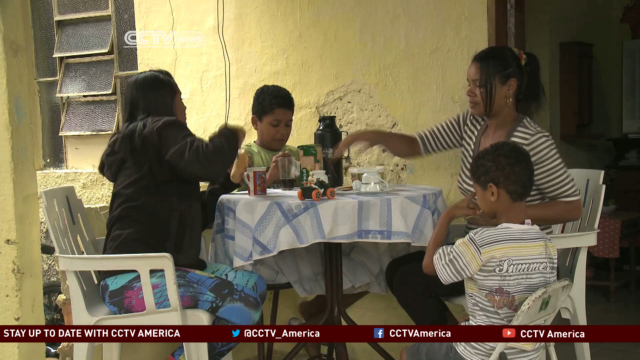All the Brazilian candidates for president have at least one thing in common: They all plan to continue a cash transfer program launched more than ten years ago that has helped pull millions of Brazilians out of poverty. CCTV America’s Lucrecia Franco reports Rio de Janeiro.
Follow Lucrecia Franco on Twitter:@LucreciaFranco

Raquel Pinheiro, 33, is the mother of four children between 4-17 years old. One child is living with an aunt. She and her husband work. She as works as a domestic helper and her husband is a construction worker. Even with two incomes, the Pinheiro’s aren’t earning enough money to put food on their table every day.
Pinheiro lives in Nova Iguacu, a distant suburb of Rio de Janeiro and she is one of many who benefit from the Bolsa Familia program, which means Family Grant. This cash transfer program allows Pinheiro to withdraw about $50 a month using a personal debit card. Most of the program’s beneficiaries are single mothers.
“The Bolsa Familia helps us to give our children things that we can’t, such as milk every day, yogurt and bread every day. It is very important for us,” said Raquel Pinheiro.
The amount given depends on the family’s income with the maximum amount of about $110 per family each month. The program is conditional on children attending school. Mariana, her oldest, is well aware of her responsibility.
“I have to study so she can receive the money. If I don’t, she doesn’t get paid,” said Mariana of her mother.
The Bolsa Familia program has lifted 50 million people out of poverty and though it was launched in 2003 by Brazil’s ruling Workers Party, all the candidates running for the upcoming presidential election have vowed to keep it going.
Despite the program’s success, Brazilian economist Adhemar Mineiro said it shouldn’t last forever.
“It is not supposed to be a permanent program. It can last maybe one more generation until people reach a more decent level of income,” he said.
The idea behind the program is to give poor families like Pinheiro’s extra help, not only for food, but to give children a better start in life. Although she still hasn’t decided who will get her vote for president, Pinheiro is glad that no politician will risk taking away a benefit that assists a quarter of Brazil’s 200 million people.
 CGTN America
CGTN America
